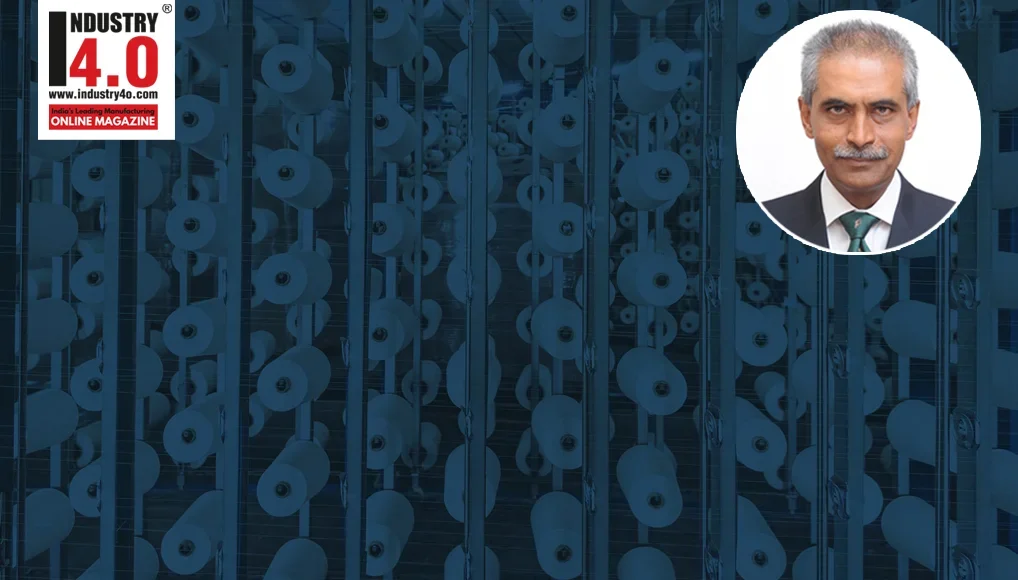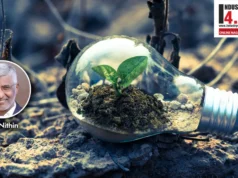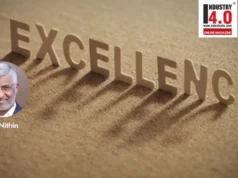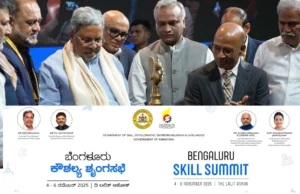An Exclusive tête-à-tête with Dr. K.V.Srinivasan [ Managing Director – Sree Narasimha Textiles Pvt. Ltd., Premier Mills Pvt. Ltd., Premier Fine Linens Pvt. Ltd., & Premier Evolvics Pvt. Ltd., Chairman – The Cotton Textile Export Promotion Council (TEXPROCIL), Vice President – International Textile Manufacturers Federation (ITMF), Zurich. Past Chairman – South Indian Textile Research Association (SITRA), Past Chairman – Southern India Mills Association (SIMA), Past Chairman – CII – Coimbatore Zone ] by D.K.Karthikeyan, Editorial Director – INDUSTRY 4.0.
Over the years you have championed the cause of textile manufacturers, and with this journey you have taken many new responsibilities. But this journey has started from PSG College of Technology. Could you please tell us the impact PSG made in your career?
I started my textile technical education in 1983 by joining B Tech course at the PSG College of Technology. In these days, it was a very extensive 5 year course. In the initial years, it covered all aspects of various engineering – civil, mechanical and electrical. This provided good foundation and technical knowledge in all various aspects of engineering, which I found very useful later on my career. The quality of technical education at PSG was also very good.
From B Tech at PSG College of Technology, India to Doctorate in Textile Technology from the University of Manchester, UK – there must have been a massive change in the environment. What was your learning?
On completion of my B Tech, I joined the MSc Textile Technology at the University of Manchester. It was a big change in many aspects academically and otherwise. At a post graduate level and in the UK, there was an emphasis for learning on your own rather than being taught. This was the first time in my career when I was away from home and on my own. It provided me with a good opportunity to learn both academically and also dealing with day to day issues myself. There was also the unique opportunity of meeting students from different countries with different cultural backgrounds.
Later on I did a PhD in Textile Technology. This was quite a unique experience as you had to work more or less entirely on your own. This was where I learned how to work with self-discipline, setting up own goals and targets and achieving it. The PhD course gave me an opportunity to fix for myself a work method, which has helped me considerably in my career.
When you started your career at Sree Narasimha Textiles & Premier Mills there must have been a huge difference in the work culture to what you observed in the UK. Could you lead us on to the challenges faced?
I started my business career at Sree Narasimha Textiles and Premier Mills in 1987. While there was a big cultural and technical difference between the university education in the UK and working in a spinning mill in India, the situation was challenging. India was beginning to open up its economy and catch up with the rest of the world. It was a unique opportunity to upgrade our technology to international levels and look beyond India to market our products. As a group, we decided to upgrade our mills to international levels. We invested in new technology, lean manufacturing processes, meeting international quality standards and looking at markets beyond India.
Can you highlight the biggest accomplishments of your career at Sree Narasimha Textiles & Premier Mills?
Our spinning mills were able to manufacture value added cotton yarns to international standards to meet high quality requirements. We moved from a company supplying entirely to the domestic market to exporting our yarns to over 50 countries worldwide in a period of 10 years.
We are told that, in your Group Companies more than 65 % of the Employees are women. Was this a conscious decision? Can you share some insights?
In our group companies, more than 75% of our employees are women. This was a conscious decision taken by our Chairman, Mr R Jagadish Chandran. He had seen this in a Japanese spinning mill and he felt it would be of help both to the industry and the society. This concept was implemented first in Premier and it was a revolution in India at that time. Our group fine-tuned this process and increased opportunities and facilities for women workers. Today, more than 75% of the industry in Tamilnadu works on the concept started by Premier. It also helped to free the industry from the shackles of the trade unions which were at that time a major constraint.
Is your Group Companies geared up to face the next evolution in Manufacturing – INDUSTRY 4.0?
Our group companies are looking to face the next evolution in manufacturing – Industry 4.0. We are changing from the conventional manufacturing systems to automation and using in our technology to run our process more efficiently. We have installed automatic monitoring of all our spindles which has resulted in a considerable improvement and efficiency. We still need to work at optimising the use of Information Technology to upgrade our production, maintenance and quality control standards.
We are also a carbon neutral company. More than 90% of our energy is green energy from the wind. All our waste water is treated and reused. Most of the waste that we produce in our manufacturing process is reprocessed into cotton yarn. We believe in being responsible and sustainable.
How has Covid – 19 affected your businesses? What are the short & long term strategies you have planned to overcome this pandemic?
COVID 19 affected our business significantly. Overnight we had to shut down our manufacturing units. Being a continuous process industry, this sudden stoppage resulted in several problems, particularly during restarting. Nevertheless, we ensured that all our staff and workers were well protected and provided for eventhough manufacturing was stopped for 2 months. We had to face a lot of difficulties when we commenced production both from a technical and marketing view point. These were the most challenging period that we had faced in recent years.
On restarting, we also ensured that our workers were very much protected against the pandemic. A detailed sanitising and quarantine program was set in place. It took us a long time to get back to normal conditions and we are probably still not fully recovered.
The Cotton Textile Export Promotion Council ( TEXPROCIL ) will look up to you for the dynamism you are able to bring to the table, given the pandemic scenario as a Chairman of this council could you list a few priorities you will like to work closely on to help the textile manufacturers?
TEXPROCIL works for the promotion of export of textile products across the entire value chain from yarn to made-ups. In recent years, the textile industry has faced innumerable challenges in export and Texprocil has taken up these issues at both national and international levels. Indian textile products face tariff bearers in certain countries when compared to our competitors. Texprocil does market research and developed markets for textile products in which India was strong. Texprocil also liaises regularly with the Government to help export promotion and ensure that the industry received the necessary support. At the moment, Texprocil has requested that the new WTO compliant RoDTEP scheme (Refund of duties and taxes on textiles) be given across all sectors of the textile industry. It also follows up with the Government to obtain FTA’s with leading markets in the world.
What are the big initiatives International Textile Manufacturers Federation (ITMF) is championing at the moment for the welfare of Textile Manufacturers?
The ITMF is an international organisation based in Switzerland which looks after the welfare of textile manufacturers across the globe. It covers all sectors of textiles and has close links with textile machinery manufacturers also.
At the moment, the ITMF is working on a unique social audit scheme for the garment, apparel and made ups sector to help both the manufacturers and the retailers.
In Global Textile Exports, India is ranked at the 5th position. Could you enumerate specific strategies which need to be put in place to make India a global leader in Textile Industry?
India is today a global leader in textiles but India’s position in the global textile market can improve further. We can improve the quality of our cotton output, look at being self-sufficient in cotton, particularly in extra-long staple, increase our share in the global man-made fibre textiles and also increase productivity levels in our garment, apparel and made ups manufacturing.
What should the Leaders / CEO’s of the Textile Industry do to raise their companies from a Surviving situation to a Thriving stage?
The Textile industry has always been very competitive, but many companies have worked hard with foresight and vision to grow even in difficult times. In order to improve one’s business, we should look at having the right blend of automation, good raw material, efficient work force; Quality oriented manufacturing process and a good marketing network.
Finally what’s your advice to the MSME at large?
The Indian Government has recently focussed on the development of the MSME sector which is growing considerably year by year. It is interesting to note that some of the largest textile companies in India originally started up as an MSME unit have grown since then. The potential for MSME units in the Indian textile sector is therefore quite good across all types of textile manufacturing.









